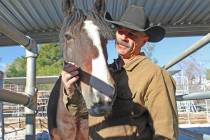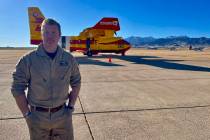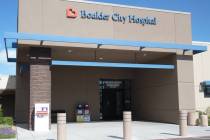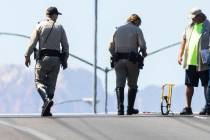Preparedness lessens severity of traumatic situation
As a firefighter and a paramedic for Boulder City Fire Department, my job duties include a variety of emergency calls.
Paramedics for the fire department, as well as the emergency medical technicians, are trained to respond to a number of different medical and traumatic emergencies. Under the supervision of doctors, nurses and other paramedics we are professionals who have three to four years of medical training, learning how to handle and diffuse different situations at any time during the day.
In addition to our years of medical training, we spend at least two to four of schooling, plus have departmentwide academy training in a number of fire-related emergencies.
As first responders for Boulder City, we are your first line of defense in what you would consider an emergency. When you pick up the phone and call 911 for an emergency, be it medical, traumatic or fire related, we are the first people you will see, we are the first people to make your day a little bit brighter.
Even though we are trained to the highest level of education fitting for our jobs under national, state and county certifications, there are things that you can do to help us get to the root of any problem and help make your family safer.
We follow certain protocols and guidelines to provide fast and effective care in an immediate and prompt manner to keep you, your family and ourselves safe. Emergencies can and will occur at any time, and no one is immune. Preparing yourself and your family for an emergency can not only help provide us with fast and valuable information, it can potentially prevent life-threatening damage to your lives and property. Preparing yourself for two types of emergencies, medical/traumatic emergencies and fire emergencies in your home or apartment, can save valuable time and make a life-saving difference.
Preparing for medical and traumatic emergencies
Some of the scariest moments in people’s lives are the times when they feel completely helpless. To see yourself or someone in your family suffering from a medical emergency or having been involved in a traumatic incident in some form is scary. The minutes before emergency medical services’ arrival can feel like hours and, with little or no medical training, you feel helpless and hopeless, anxiously awaiting the arrival of paramedics.
At the Boulder City Fire Department, we are promoting a proactive approach to medical and traumatic injuries and illnesses. During an assessment, to get a better understanding of the patient’s health and medical history, we ask a series of questions of every patient.
Taking the time to write down this valuable information accurately will help provide fire responders and paramedics with a better understanding of your current situation. Preferably hanging on your refrigerator, or in another area as common or easily seen, should be a piece of paper detailing your medical history. For each member of the family there should be a different sheet of paper with their information.
The information that we would like to see, that would benefit us most, are:
n Patient information including name, address, birthday and Social Security number.
n Medical history including a list of any and all previously diagnosed conditions by medical professional; any surgeries or surgical procedures; name and phone number of your primary care physician and specialty doctors (i.e., if you have been diagnosed with heart problems, we would like to know who is your cardiologist).
n Medications including all prescribed and over-the-counter medications, and vitamins or supplements currently being taken.
n Allergies, especially known allergies to medications and food.
n Emergency contacts; a list of relatives, parents, family and friends who you would consider to be your emergency contact, someone we can notify if you are having an emergency.
As paramedics arrive on scene this paper for the person or persons involved in the medical or traumatic injury should be given to the lead paramedic or the captain.
Preparing for fire-related emergencies
In every home there is always an inevitable risk of having a house fire. Although the majority of the time house fires can be prevented, there will always be accidents.
Aside from preparing your house with smoke detectors, fire extinguishers and keeping all flammable fluids and fire-starting materials away from children there are some extra steps you can follow to help assure your family will be safe and away from harm. The Boulder City Fire Department recommends a family evacuation plan and map for every home and apartment.
With children and or elderly people living under your roof it is important that every person in the house knows how to identify a fire in the home and know how to properly evacuate the building and get to a safe meeting location. If your house or apartment catches fire, things may become chaotic and nerve wracking. Being able to keep your cool and calmly maneuver out of harms way can and will be a huge advantage when assuring the safety of your family.
Here are a few simple helpful tips to implement in your family’s home.
n Draw a map of the house, a floor plan of the entire home, including the front and back yards and the garage. On your map label each room for their significance with all doors and windows leading into them. For example, John’s room, kitchen, garage, etc.
n It is a good idea to identify and place the locations of all the smoke detectors, telephones and fire extinguishers on your map.
n From each room in the house everyone should know two possible exits to the outside. On the map you should be able to draw and label exit routes to escape a fire.
n Once everyone is out of the house, it is a good idea to have a rendezvous or meeting location to help identify when everyone is out of the house, and to keep everyone together once out of danger. Examples of family meeting locations include the mailbox, across the street next to the palm tree, on the neighbors front porch, etc.
n Once out of the house you should retreat a safe distance and call for emergency responders and firefighters to help mitigate the situation.
n Make copies of the completed map and evacuation plan for each of the bedrooms and, as a family, practice certain situations. This is similar to public schools doing fire drills or shelter in place drills on a monthly basis.
Take the time to come up with a plan and when the emergency happens you will thankful and glad you did!
If you have any other questions or comments regarding emergency preparedness, please feel free to contact me at the fire house at 702-293-9228. Thanks and have a wonderful weekend.
Brian Shea is a Boulder City paramedic/firefighter.











